
Panasonic Avionics introduces Astrova
Panasonic Avionics started off this year’s AIX by unveiling an extension of its Astrova IFE portfolio with new 4K OLED monitors for First- and Business-Class cabins.
The larger screens will be available to airlines in five sizes: 19, 22, 27, 32, and 42 inches, boosting the appeal of Astrova for the widebody aircraft market. Every new size monitor introduced at AIX 2023 has already been selected by an airline.
Astrova is Panasonic Avionics’ next generation IFE seat-end solution and has been adopted at a higher rate than all previous industry-leading IFE systems, and Astrova creates a fully immersive experience for passengers, with industry-leading 4K OLED screens coupled with spatial audio delivered by Panasonic Avionics’ latest Bluetooth technology.
The image quality is sharper, clearer, and with infinite contrast ratio to deliver cinema-quality colors and perfect black. Combined, this provides a better viewing experience than has ever been available before on a commercial aircraft.
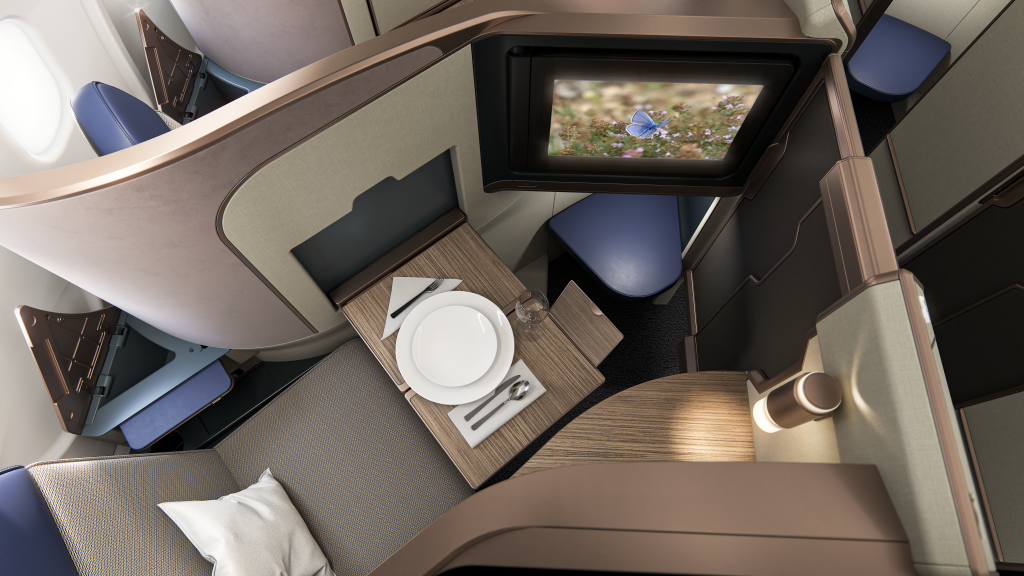
Collins unveils Aurora premium narrowbody lie-flat business suite
Collins Aerospace unveiled Aurora, the company’s first fully lie-flat Business Class suite designed exclusively for narrowbody aircraft. Aurora is uniquely configured, optimizing passenger living space and storage options within the suite.
The seat width is maximized, giving passengers more room than existing solutions. Passengers are set deeper into the seatback and next to the window—increasing privacy and maintaining 78 inches of bed length. Aurora is scheduled to deliver to its first customers beginning in 2024.
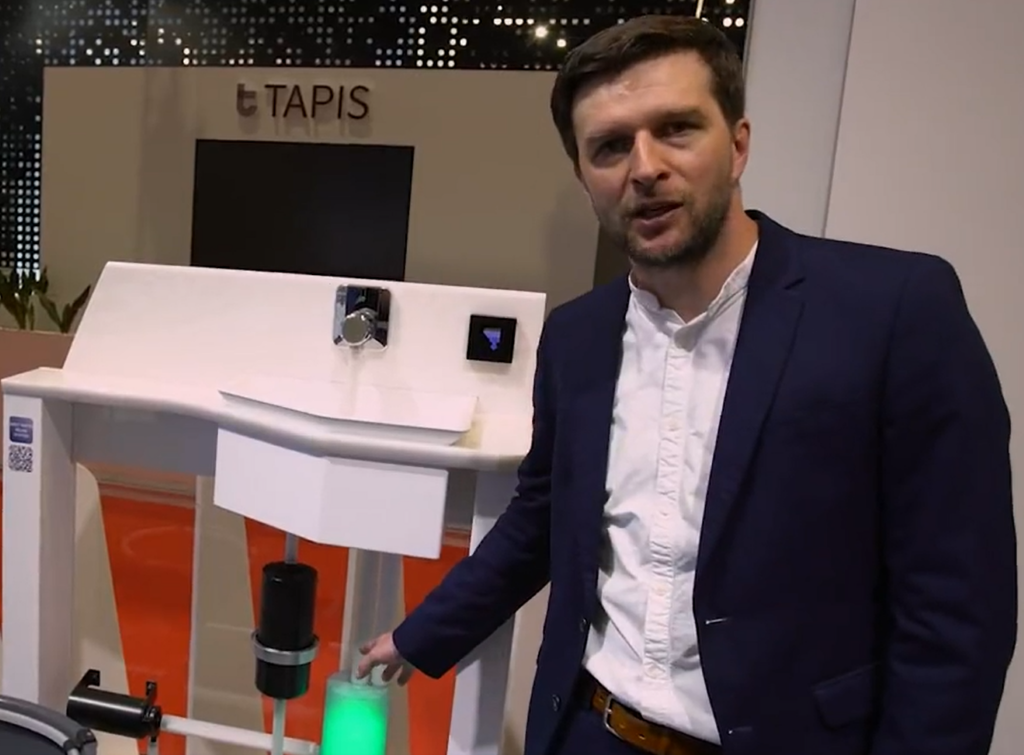
Diehl Aviation’s ECO Grey Water Reuse System
Instead of using precious potable water, the system reuses handwash water to flush the toilet. The handwash water is led into the grey water tank where it is treated and then pressurized by a grey water pump on demand to flush the toilet. By doing so, you can save up to 250L of potable water per flight, reducing CO2 emissions by 90 tons per aircraft and year. The system is currently being flight tested on Boeing’s ecoDemonstrator aircraft. Pictured: Diehl Aviation Lead Engineer Research Systems Bertram Skibinski.
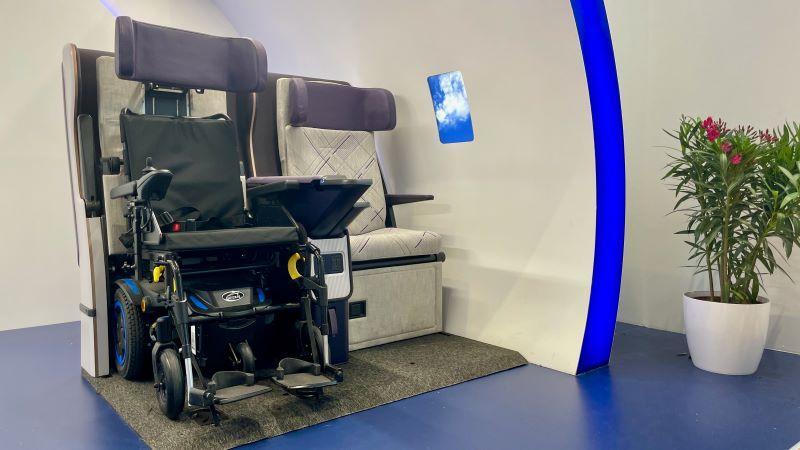
Personal wheelchairs in the cabin moves forward
In an industry that prides itself with seemingly never-ending cabin upgrades, the fact that personal wheelchairs are still not allowed in the cabin is unacceptable and has remained virtually hidden for too long. A solution is now in development. At the 2022 AIX Aviation Week met the promoters of the idea—enabling a personal wheelchair to fit into a modified, partly foldable aircraft seat.
What was then a concept has now turned into a product, displayed at Delta Flight Products’ stand at AIX 2023.
Delta Flight Product Engineers are confident they will meet aviation’s 16g standard. They expect to complete the FAA’s Technical Standard Order process in the usual 18 months. Next in line are static and dynamic tests, which will involve a heavy model of wheelchair to cover the most demanding scenario.
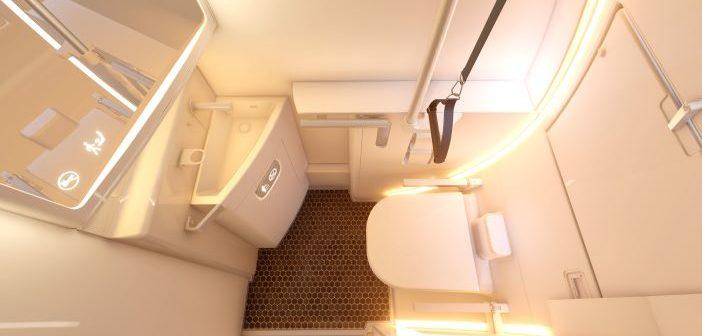
ST Engineering’s ‘Access’ lavatory receives EASA STC
ST Engineering received a Supplemental Type Certificate (STC) from EASA for its Access aircraft lavatory, which is designed for installation on Airbus A320 family aircraft. Developed for passengers with reduced mobility (PRMs), the Access lavatory can expand to create around 40% additional floor space, enough for a passenger in a wheelchair and a caregiver. ST Engineering will now work to make Access available on the Boeing 737 platform, with certification targeted for 2024.
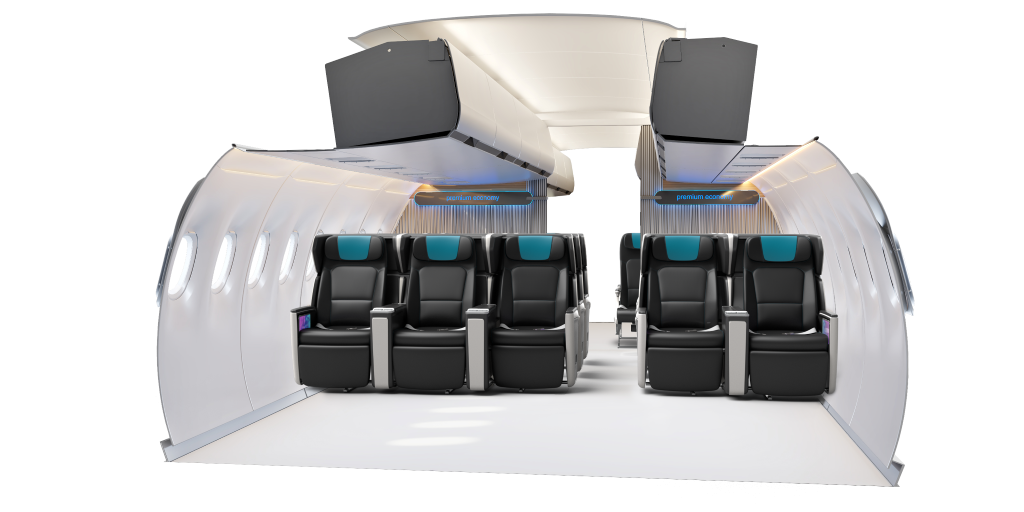
Diehl Aviation partners with HAECO on staggered seating concept
Diehl Aviation and HAECO Seating Concepts have teamed up to present asymmetrical cabin layout with staggered seats (Eclipse Staggered Seats), a new and innovative premium seat designed for maximum comfort in a 5- or 4-seat configuration. The special feature: In the 5-seater seating, the passengers do not sit one behind the other as usual, but always slightly offset. This increases the level of comfort for the passengers considerably: due to the staggered seats, the shoulders of the passengers are not at the same height as their immediate neighbors. In addition, the rear seats are framed by a fixed backrest. When the backrest is tilted backwards, this occurs without disturbing the passenger sitting behind it.
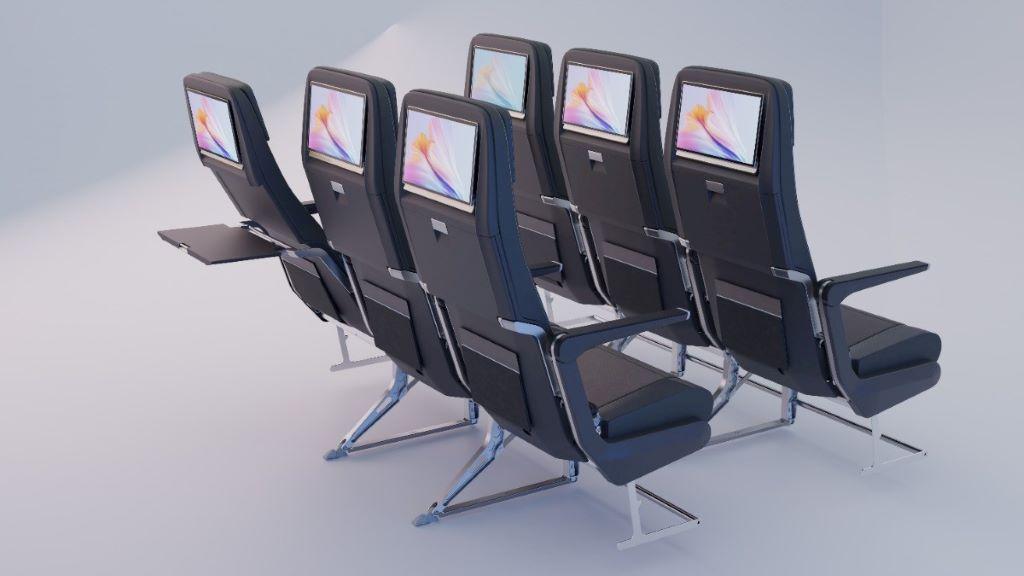
Mirus Aircraft Seating unveils Falcon economy seat
Mirus Aircraft Seating unveiled its mid- to long-range economy seat, the Falcon. With a slimline seatback designed for maximum living space, the Falcon incorporates the signature Mirus design philosophy of simplicity and elegance to enhance the appearance and redefine the living space and comfort of the economy cabin.
The team at Mirus has taken a fully integrated industrial design approach to develop the Falcon, meeting the rigorous and diverging demands from ultra-low cost to premium carriers.

Teledyne ACES system monitors cabin environment
Teledyne Controls has developed ACES, a Cabin Monitoring System that gives operators the means to fully understand air quality in their aircraft, address potential air quality issues with comprehensive data, and ultimately deliver a safer flying experience for their passengers. The first FAA and EASA certified Cabin Air Monitoring System, Teledyne ACES is a complete and autonomous solution that enables aircraft operators to monitor, measure and analyze air quality in the cabin and flight deck. With wireless connectivity to a secure cloud service portal, Teledyne ACES laboratory-grade sensor technology continuously monitors and records the air quality in the cabin and flight deck for potentially harmful contaminants.
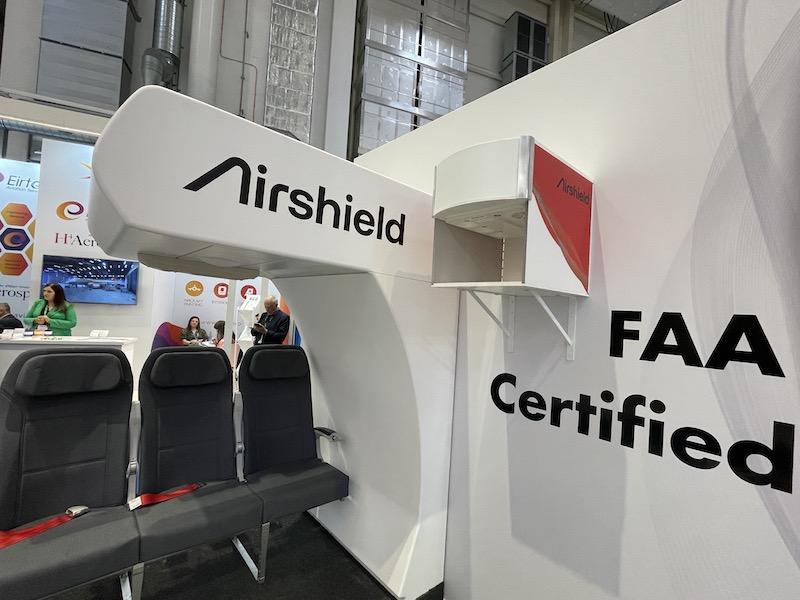
Pexco’s AirShield is now certified
AirShield is a simple component installed over the top of existing passenger air vents—also called gaspers—in the cabin, where it repurposes purified air from the aircraft’s high-efficiency particulate absorbing (HEPA) filter systems to create protective air barriers around and in between each passenger.
After being developed by Seattle-based design company Teague, Pexco acquired the AirShield design in May 2022. Pexco quickly moved the technology beyond the concept phase, securing FAA certification for installation on the Airbus A320 family earlier this year. According to Pexco, AirShield has been certified to improve the flow of air in the aircraft by 230% and reduce shared air particles by 76% to help minimize the spread of airborne viruses.
Anthony Ciringione, Pexco Aerospace’s vice president for sales and marketing, tells Air Transport World here in Hamburg that the product is now “ready to go on planes.”
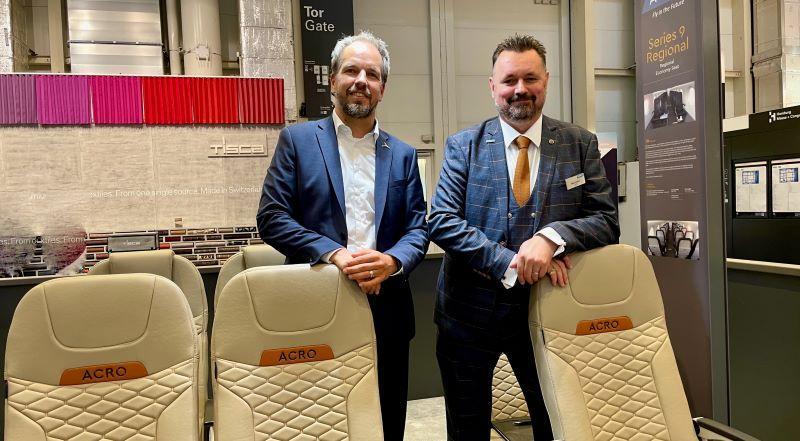
Deutsche Aircraft picks Acro Aircraft Seating
Deutsche Aircraft has selected Acro Aircraft Seating for the passenger seats of its in-development D328eco turboprop upgrade.
Designed for short-haul applications, Acro Series 9 seats are light weight. On the baseline D328 turboprop’s 40 seats, passengers will be provided with in-seat USB sockets. Acro Series 9 will also equip Deutsche Aircraft’s other two products, the D328-100 turboprop and D328-300 twinjet retrofits. Deutsche Aircraft COO and MD Nico Neumann and Acro Aircraft Seating CEO Neil Cairns signed the contract at the Aircraft Interiors Expo (AIX).

Caterer LSG Group develops food waste analysis tool
Catering specialist LSG Group has developed a way to analyze plate waste and suggest carriers to modify their menus accordingly.
With its Artificial Intelligence Consumption Analytics (AICA) tool, the Lufthansa subsidiary offers to capture photos of every tray when it arrives at its washing facility. AICA sorts the food items and categorizes their end status in three colors. While green indicates it was fully eaten, orange stands for partially eaten and red for untouched.
The resulting diagram helps a carrier’s decision makers determine what to include in the next menu. The saving potential has been calculated at $3,000 per flight. Part of that can come from the use of fewer containers in the tray, as some small food items can be regrouped into one plate. LSG has 10 customers for AICA.
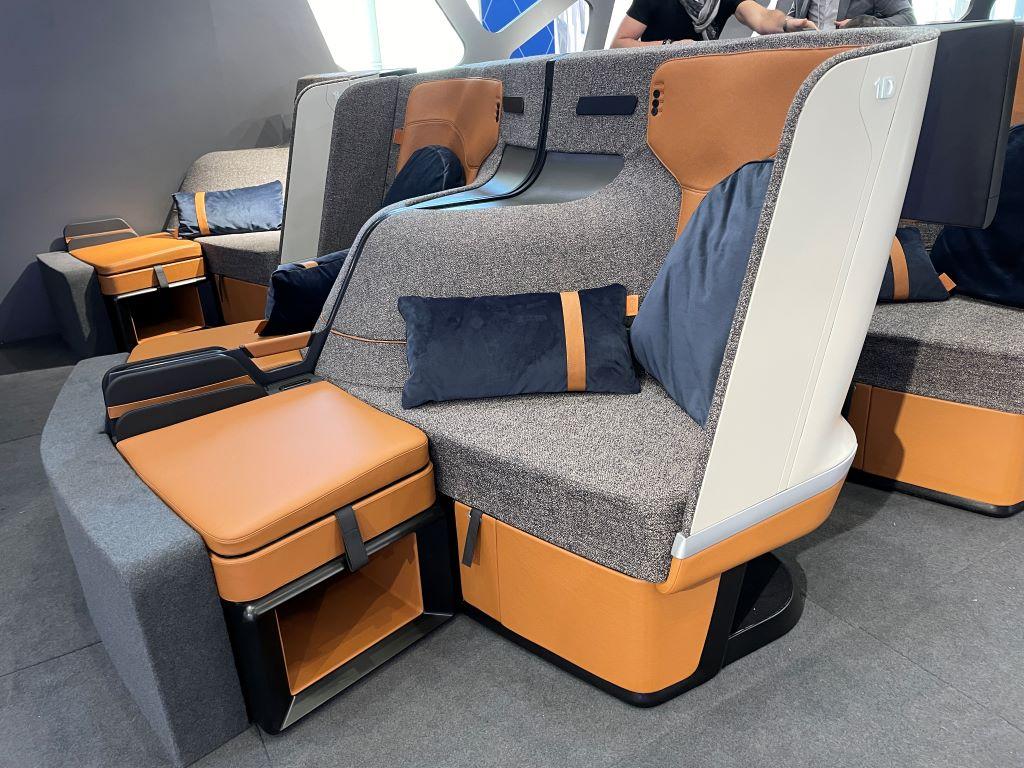
Optimares shows sustainable 'SoFab' business-class seat
Italian seat manufacturer Optimares showed its most sustainable seat, SoFab, to AIX.
According to the company website, the unique design of the SoFab consists of far fewer components than a traditional electrically reclining seat, which the company says has many benefits when considering the drive to a sustainable aviation industry.
No electrical components, besides the IFE, mean that there is a considerable reduction in the manufacturing of such items, and certainly a greatly reduced supply chain, resulting in less energy during component manufacturing and shipping time costs.
Materials from sustainable sources will be the focus through the use of recycled or recyclable products in manufacturing, as well as lean manufacturing principles. Finally, with a per passenger seat weight of approx. 50kg (not including IFE components, seat belts, life vest), the SoFab represents on average a greater than 50% weight saving when compared to similar seats (guaranteed seat weight between 50 to 60 kg depending on final technical selected package and Trim & Finish). It uses 40% fewer parts with a 90% reduction in onboard electricity consumption.
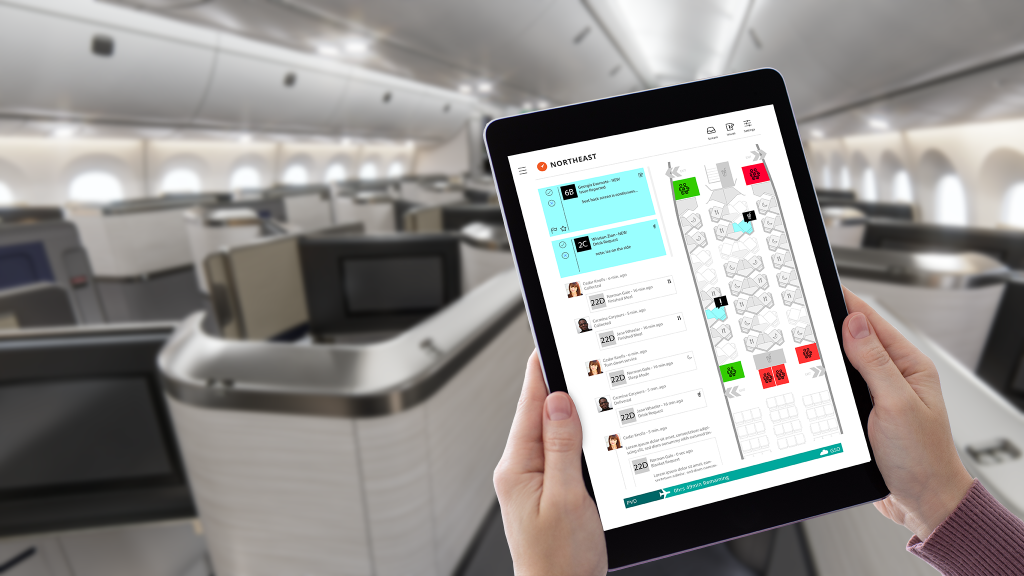
Collins’ InteliSense innovates intelligent cabin
Collins Aerospace’s InteliSence intelligent cabin is an intuitive, integrated intelligence system, providing cabin crew and maintenance technicians with insights and predictions to improve airline operations, cabin service and the passenger experience. Combining advanced artificial intelligence, deep machine learning and an array of sensors, the InteliSence intelligent cabin enables predictive service, predictive maintenance and a more personalized air travel experience.
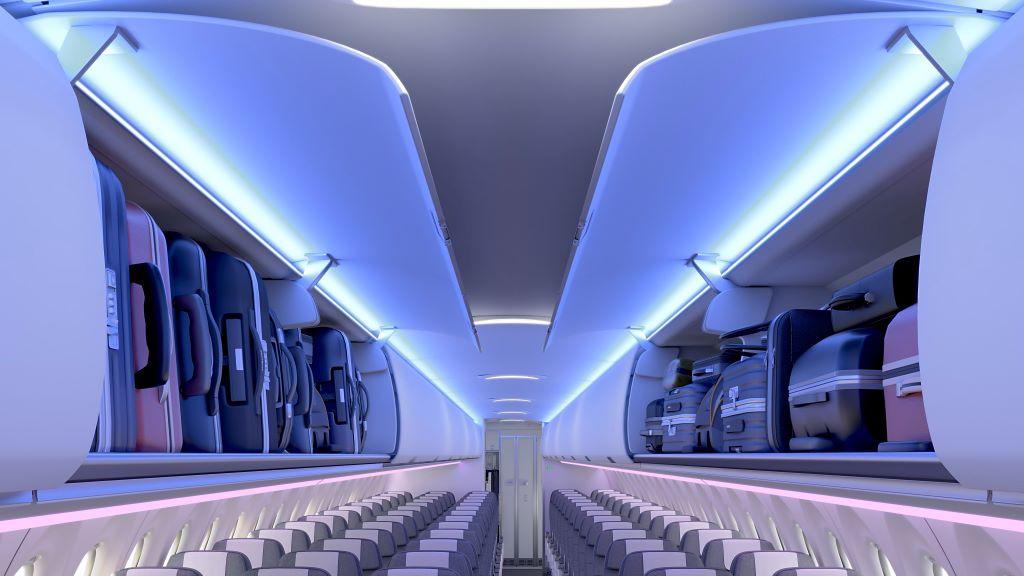
Airbus adds Airspace Cabin to A220; Diehl to offer XL Bin
Airbus will offer its Airspace Cabin on its A220 models, featuring a cabin enhancement that includes the Airspace XL Bin—provided by Diehl Aviation—which offers increased capacity and lighter weight. The new A220 Airspace XL Bins, which will become available from 2025 and will be retrofittable, offer increased capacity of around 19 more passenger bags (on the A220-300), as well as accommodate longer and heavier payload items thanks to its four-frame design.

Safran introduces RAVE Ultra plus IFE system
Safran Passenger Innovations (SPI) announced its next generation In-Flight Entertainment System (IFE), RAVE Ultra plus. Built on the foundations of RAVE Seat-Centric system and RAVE Ultra, RAVE Ultra plus is designed around three key principles, Sustainable – Flexible – Powerful.
Sustainable—Depending on the aircraft configuration, RAVE Ultra plus represents up to 23% weight savings over its predecessor RAVE Ultra. This is achieved by using smaller and lighter Line Replaceable Units (LRU’s) and optimizing cable weights by reducing the number of wires, an important factor as cables make up approximately 30% of the total system weight.
Flexible—The RAVE Ultra plus core product incorporates a lightweight DC seat power system that powers the in-seat RAVE IFE system and provides up to 60w USB fast charging per passenger.
Powerful—Powered by RAVE OS, an Open Software Platform that allows 3rd parties to develop applications that can be seamlessly run on RAVE, giving power back to airlines to control their own IFE features.
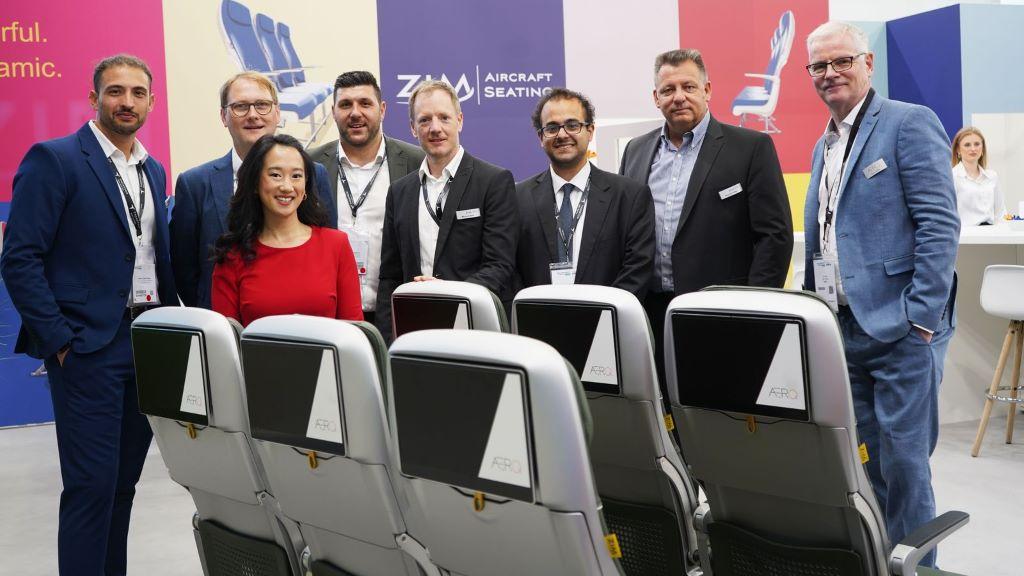
AERQ, ZIM Aircraft Seating team up on digitalized cabin
ZIM Aircraft Seating and digital cabin solutions provider AERQ are collaborating to propose the integration of AERQ’s AERENA Inseat System into ZIM's seat design of ZIMLITE L, shaping the future of a digitized cabin together.
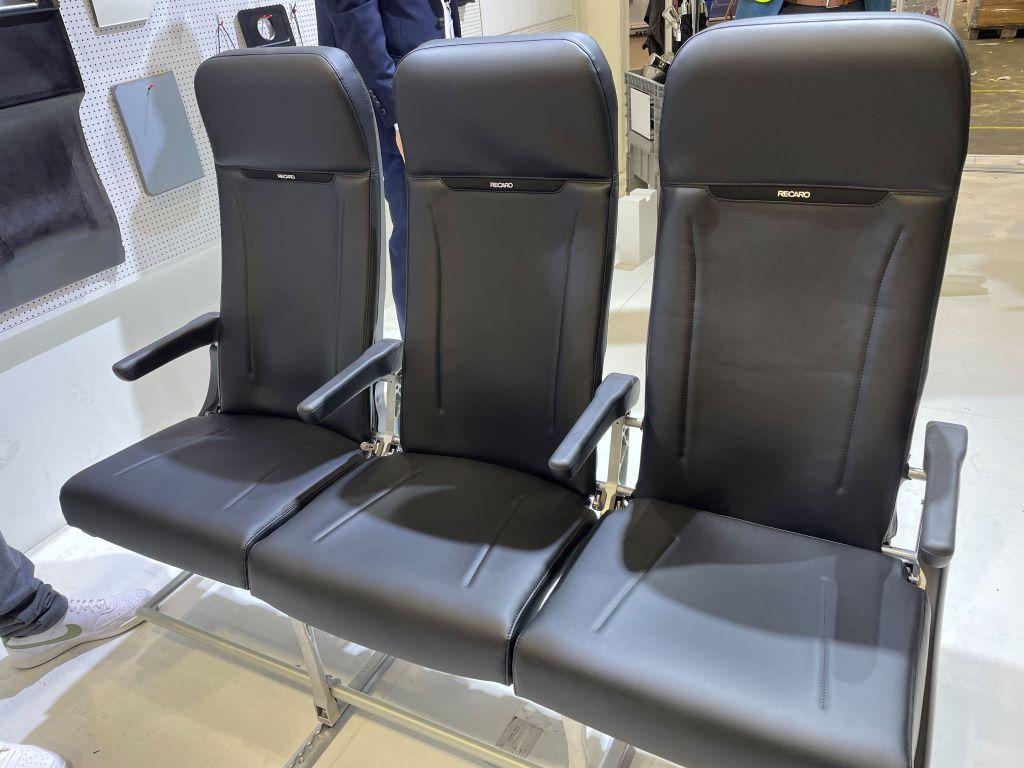
Recaro introduces ‘R Sphere’ sustainability concept seat
Recaro unveiled its “R Sphere” seat, a sustainability concept that focuses on the rigorous lifecycle assessment of Recaro seats, which is an extensive process used to build more environmentally friendly products, end-to-end. According to Recaro, the “R Sphere” seat concept was created with lightweight and recyclable materials such as cork, wood, fishing nets and cactus. The goal of the project--part of Recaro's Innovation Station--is to develop a model to collect and track feedback that will be used to make future Recaro products more sustainable.
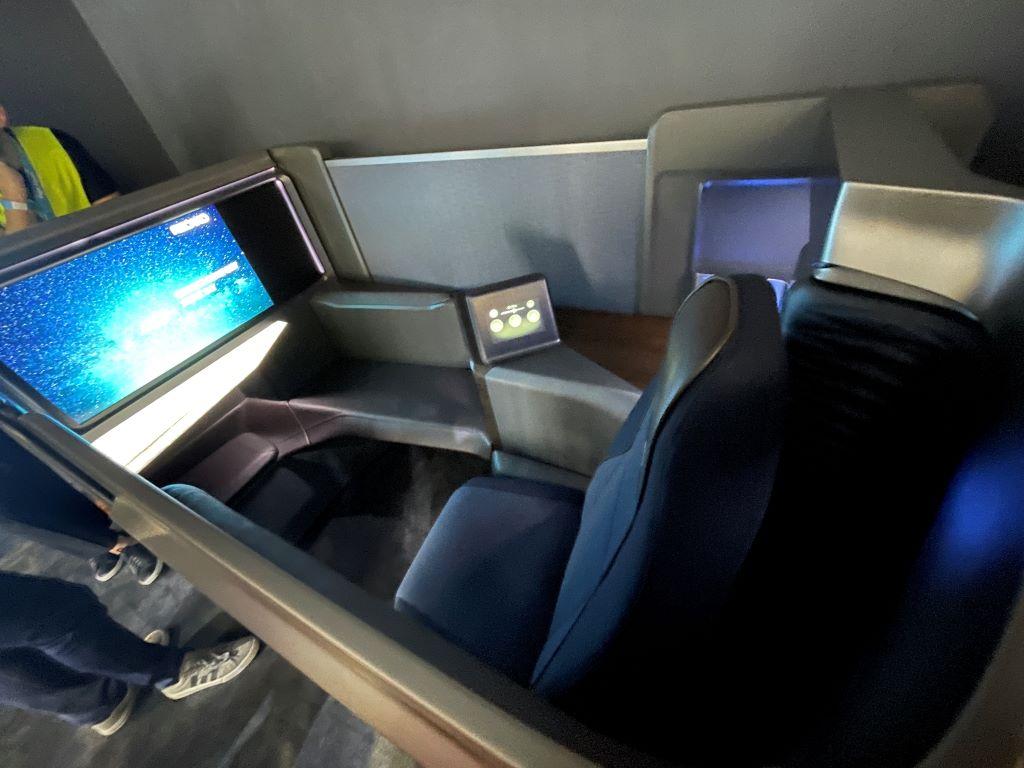
Recaro’s ‘R Horizon’ concept uses smart technology
Part of Recaro Aircraft Seating’s Innovation Station included the “R Horizon” concept, which uses a combination of smart technology and sustainability initiatives. The new business-class concept seat featured an integrated smart cabin technology. Outfitted with a new trim and finish of wood and marble, the R Horizon is created in collaboration with partners Panasonic Avionics and Headis on the initiative.
Through the use of ambient lighting and sound, passengers are guided through the different legs of their flight (boarding, morning, afternoon and night). The seat is also equipped with an active seating application, where passengers can be guided through games, exercises, relaxation or mental wellness programs.
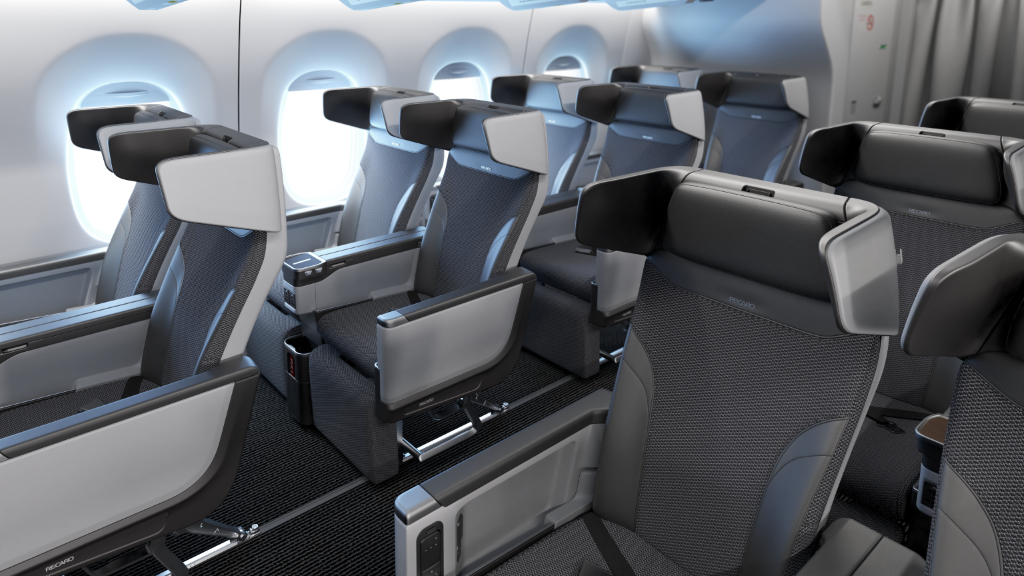
Recaro showcases evolved PL3810 premium seat
Recaro Aircraft Seating unveiled its newest addition to its portfolio, the PL3810 premium class seat. Embracing premium and space, the brand-new product will enhance the passenger journey for premium class travelers.
The PL3810 is the result of comprehensive market and observational research, as well as global trends and our extensive experience as a leading supplier in the premium segment. The vast spectrum of amenities and ergonomic features of the PL3810 means it can be used as a premium class seat for widebody aircraft.
Passengers can take advantage of the single-plate table, 4.5- inch center armrest, a six-way adjustable headrest, a nine-inch recline with articulation, and calf-rest. Another major part of the seat’s design are the privacy wings, which further enhance the living space and ties back to the need for passengers to “own their space.” Weighing 10% lighter than its predecessor, this gives an airline more cabin flexibility and helps save on fuel costs, while making their fleet more sustainable.
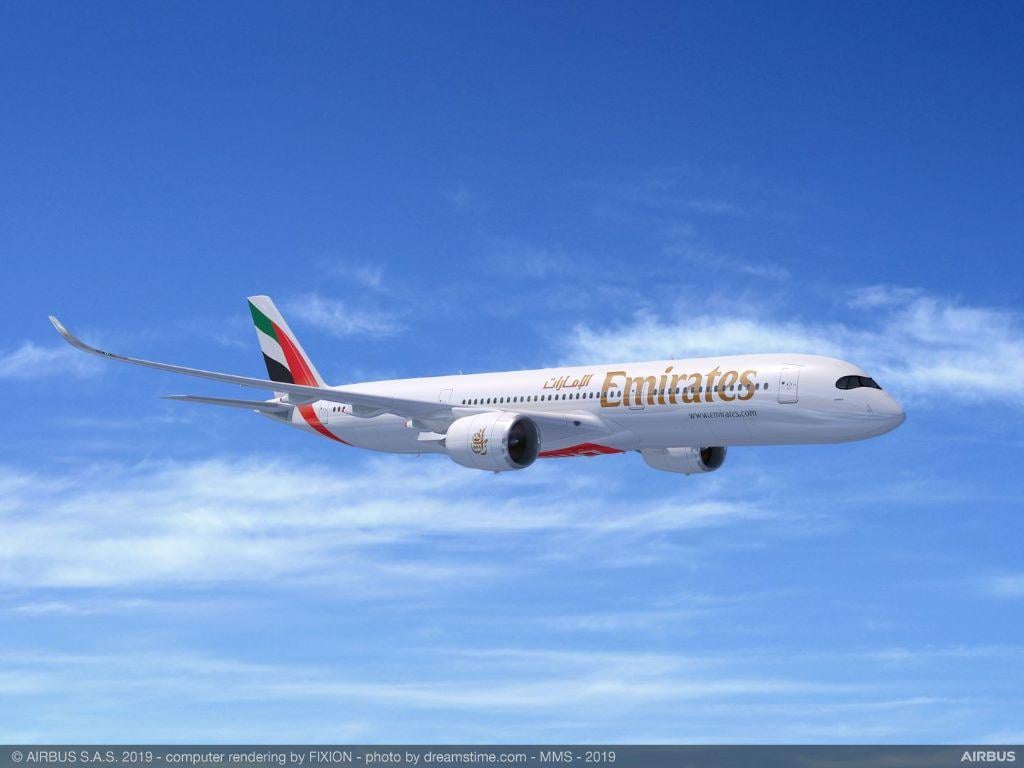
Emirates Airline becomes launch customer for Airbus HBCplus
Emirates will become the first airline to operate Airbus’ HBCplus agnostic satcom connectivity solution following its line-fit selection to equip its 50 new A350-900 aircraft with the service. With Emirates’ first A350 aircraft arriving in 2024, and more HBCplus airline customers set to follow across our various aircraft families, Airbus is preparing to ramp-up HBCplus-equipped aircraft.

Ethiopian Airlines chooses Airbus’ HBCplus for new A350-1000s
Ethiopian Airlines will equip its four new A350-1000s with Airbus’ integrated satellite connectivity solution: HBCplus. With this selection, the airline becomes the second airline to choose HBCplus. These equipped aircraft will be delivered starting from Q3 2024.
Airspace Link HBCplus provides satcom based off-board connectivity for the Airspace Link open ecosystem, available both in linefit and retrofit. Initially encompassing Ka-band services, it will enable the airline to connect to a choice of Managed Service Providers (MSPs), in this case with Inmarsat – via a new certified terminal and antenna built as part of the aircraft.
Pictured, from left: Airbus VP Cabin & Cargo Program André Schneider; Ethiopian Airlines Group CEO Mesfin Tasew; Ethiopian Airlines; Viasat GM & VP-Commercial Aviation Don Buchman; and Inmarsat President Niels Steenstrup (recently acquired by Viasat).

Jazeera to fly Expliseat’s TiSeat E2
French seat designer and manufacturer Expliseat will provide the airline with more than 2,000 of its new TiSeat E2 second-generation model seats, with deliveries starting in the 2024 first quarter.
The retrofit will take place on 11 Jazeera aircraft—a mix of Airbus A320ceo and neo models, as well as a number of A321s. The refit will take place at a yet-to-be-decided maintenance, repair and overhaul provider. Jazeera is the Middle East launch customer for the new design. The new seats, which weigh 6.8 kg (15 lb.) each, will save Jazeera around 1.2 tons per aircraft.

Thales unveils onboard data center
Thales has partly unveiled an onboard data center that will enable passengers to stream their own content on their device, via an interface customized for the carrier. The inflight entertainment (IFE) provider wants to offer a more cost-efficient arrangement for airlines, while maintaining the relationship with passengers. The onboard data center will rely on satellite connectivity and cache memory. Thales said it has recently signed close to €200 million ($215 million) of contracts for the onboard data center with unnamed customers.
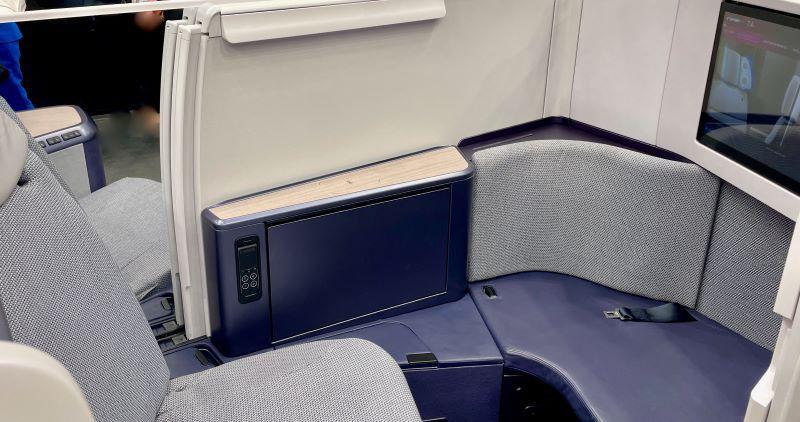
Safran unveils Air New Zealand Business Premier seat
One year after its introduction, the new Business Premier seat developed by Safran Seats for Air New Zealand’s premium class was presented at the Aircraft Interiors Expo.
Customized for Air New Zealand from Safran’s Visa platform, the Business Premier seat can convert into an 81-in. bed. It comes with multiple stowage spaces and a 25-in. TV screen. As the seat can be moved into several viewing positions, the screen is fixed, thus saving the weight and complexity of a tilting mechanism. As in most modern business class seats, furniture is arranged to give a feeling of privacy.
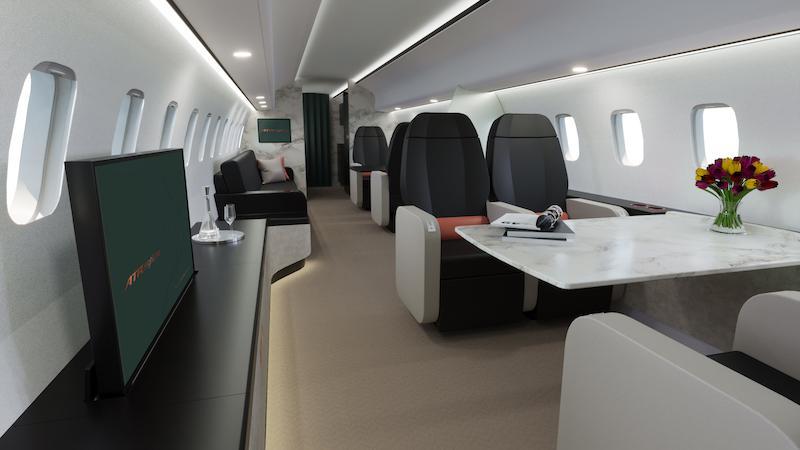
ATR launches HighLine suite
Regional turboprop manufacturer ATR has launched HighLine, a suite of five configurations to address the high end of air transport, including business aviation.
Configurations include Multi-Section, which combines a VIP seating area with, for instance, a separate two-seat section for bodyguards and 52 conventional passenger seats; All-Business Class configuration sports a two-abreast seat layout for up to 30 passengers; The Multi-Class configuration offers a first-class section with a three-abreast layout, an “Economy+” section with extra leg room, and an economy class. Typical capacity stands at 50 passengers; and Premium Flex configuration, which uses ATR’s X-Space Table to offer an experience close to business class.
All configurations are being offered on the ATR 72-600 and the 50-seat-class ATR 42-600.
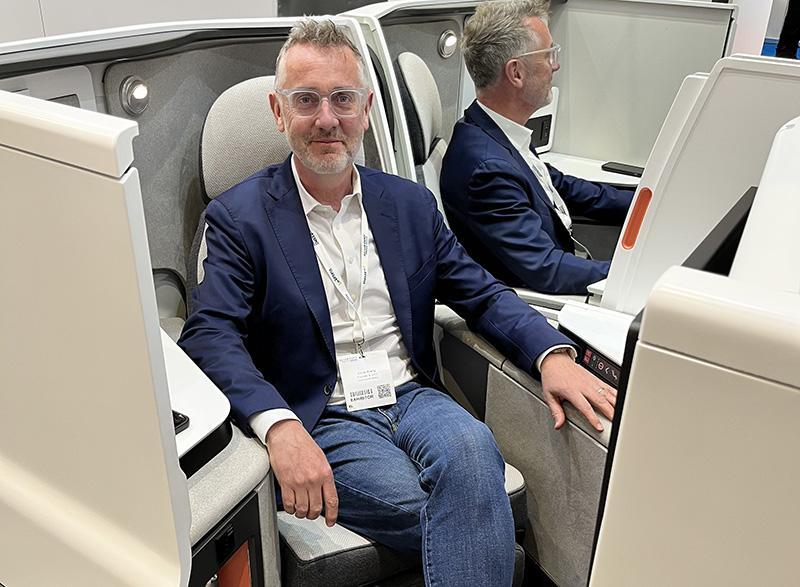
New UK seat manufacturer Unum ready for orders
New aircraft seat manufacturer Unum will have its first contract “100% by the end of the year,” Founder and CEO Chris Brady (pictured) said at AIX. The company has just acquired a new factory at Crawley, Surrey, near London Gatwick Airport and in the past week unveiled its second business-class seat. Its first product, Unum 1, was a staggered seat for herringbone-design premium cabins. Unum 2 is a forward-facing seat.
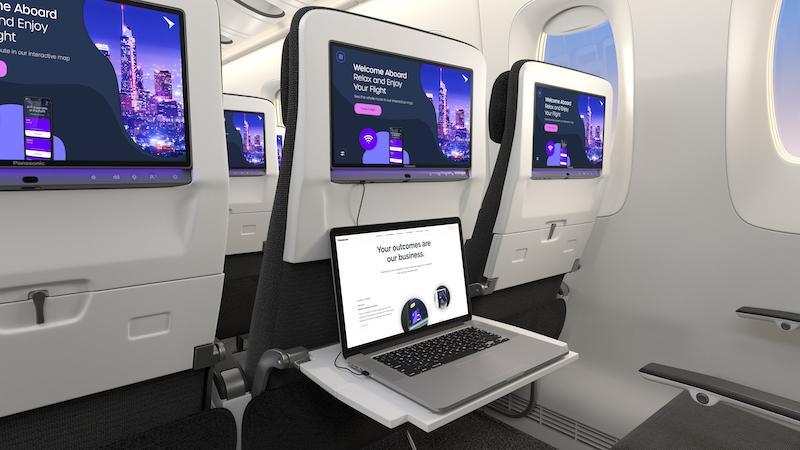
United makes huge IFE investment in Panasonic IFE screens
United Airlines plans to install nearly 300,000 seatback inflight entertainment (IFE) screens from Panasonic Avionics. The screens will be fitted on the carrier’s new Airbus A321XLRs and Boeing 787s from 2025. Chicago-based United will be the North American launch customer for Astrova.
The new A321XLRs and 787s form part of the airline’s international fleet, but the close-to-300,000 screens, which cover United’s June 6 order and an earlier commitment, will also be installed on the carrier’s domestic fleet as part of the United Next program to refurbish domestic cabins. Panasonic Avionics said it is the largest ever investment in its IFE product by any airline.
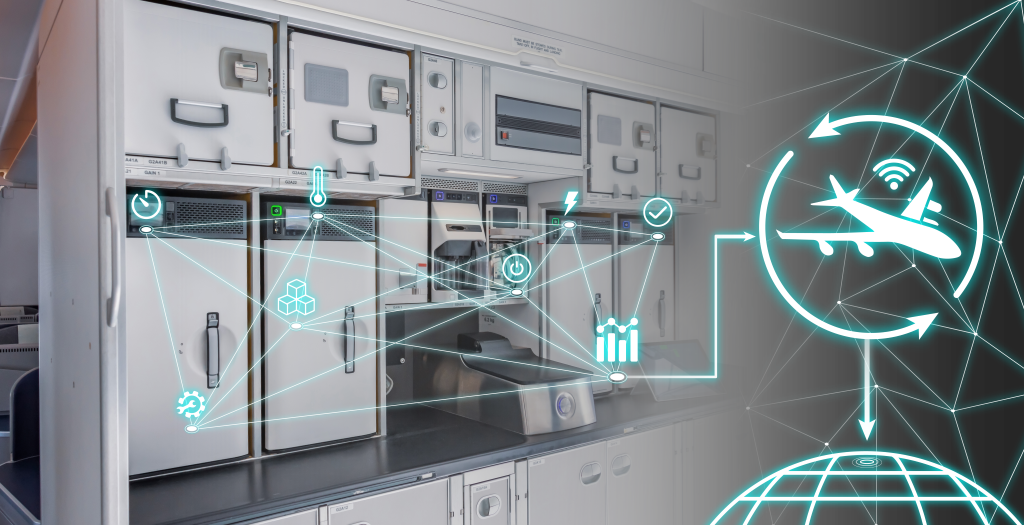
Collins introduces wireless galley inserts
Collins Aerospace introduced what it called a “cost-effective wireless connectivity solution for airplane galley inserts (the appliances used to prepare inflight food and beverage), providing operational efficiencies and cost savings for airlines while also supporting improved passenger service.

Italy’s ITA Airways picks Airbus Services for A350 retrofit upgrade
ITA Airways has signed a cabin retrofit agreement with Airbus Services to upgrade its six A350s-900s. The key feature of the upgrade is the installation of a brand new Premium Economy (PY) class section into the cabin. Completion of the project and re-delivery of the six upgraded aircraft is expected in mid-2024.
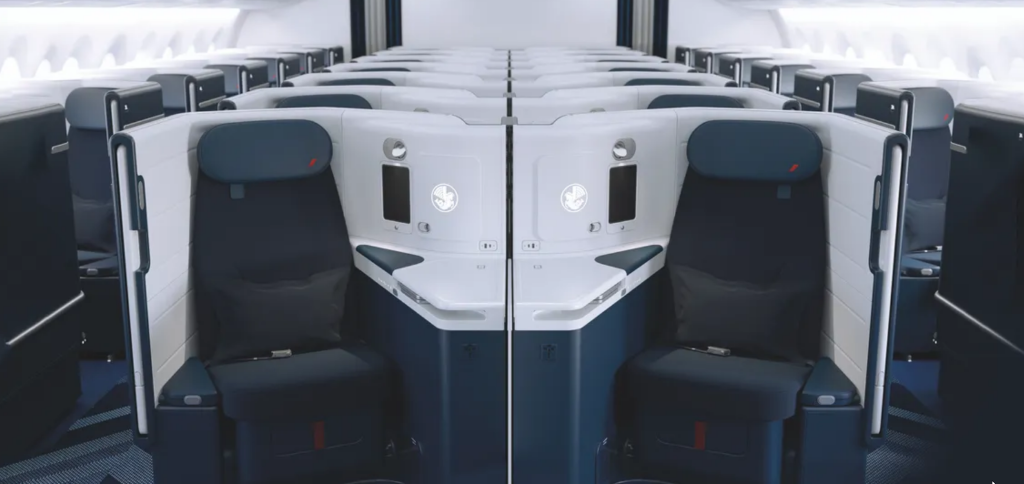
STELIA Aerospace, Air France unveil long-haul business class seat
This seat—the jumbo platform version of OPERA—was designed especially for Air France. It is based on the 3F concept: “Full Flat,” which allows the chair to turn into a real bed almost 2 meters long, “Full Access,” allowing all passengers direct access to the aisle, and “Full Privacy,” which ensures optimal privacy. A sliding door makes it possible to create a completely private space, with a greater feeling of intimacy for passengers traveling in pairs. Seats located in the center of the cabin are now equipped with a central panel which can be lowered by pressing on it, thus creating a convivial space in which passengers can spend a pleasant moment together during the flight.
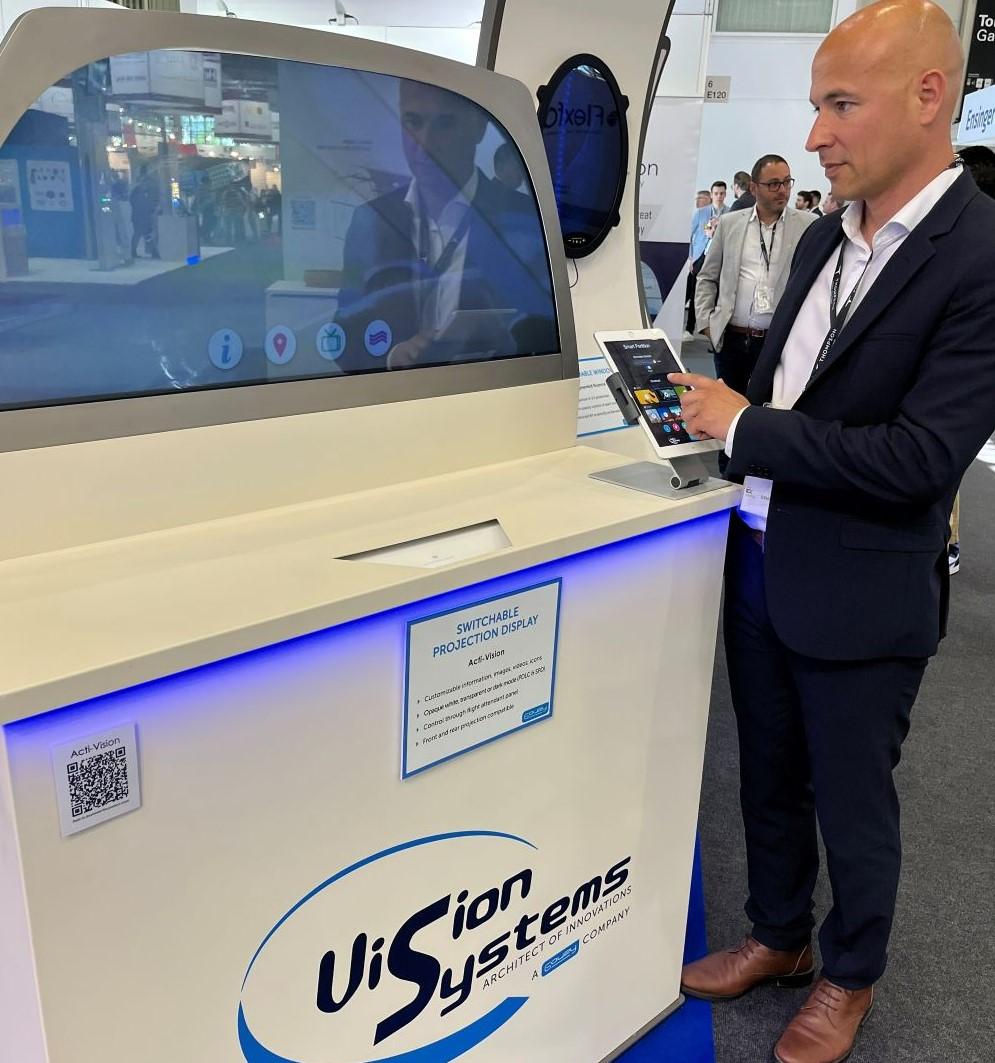
Vision Systems unveils interactive windows
French company Vision Systems is showing a new concept utilizing ‘active glazing’ for interactive windows, or a partition that can double as a privacy application and infotainment and information center for passengers. The Acti-Vision switchable projection display combines technologies that allow it to function as a dimmable window and also to become opaque to give privacy. An SPD film of polarized particles provides the dimming capability, while PD liquid crystals provide the privacy component.
The system is already flying, on both commercial aircraft and business jets, Vision Systems’ sales director Nicolas Laurent (pictured) said as he demonstrated the dimmable/opaque window unit.
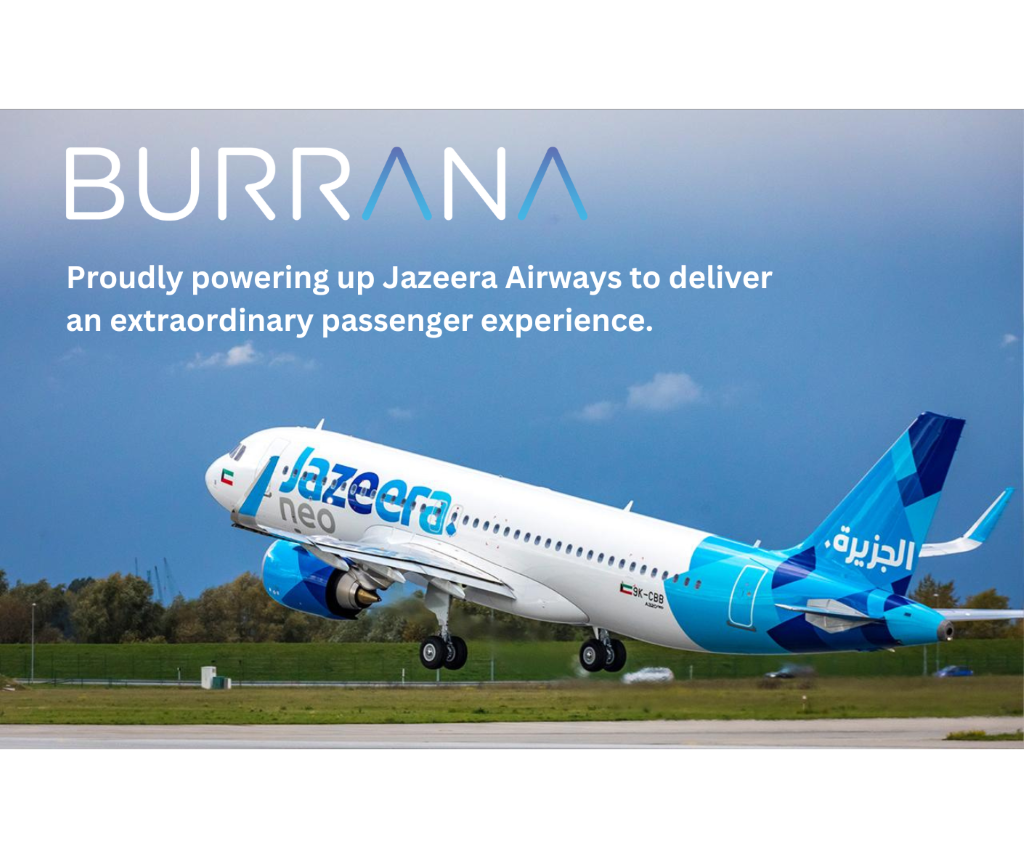
Burrana selected by Jazeera Airways for in-seat power
Kuwait-based LCC Jazeera Airways has partnered with Burrana on its lightweight in-seat power solution for its cabin retrofit program on Airbus A320 and A321 fleets. Each passenger will have USB-A and -C outlets to power and charge their personal electronic devices with a system that provides equitable power at every seat, with multiple levels of redundancy, delivering the highest reliability.
Burrana said it achieves this with a “unique 48VDC architecture, with intelligent power sharing distribution and load shed management that enables all passengers to enjoy their personal devices for the duration of the flight, not needing to worry about running out of battery. Passengers will also experience the upmost comfort with no intrusion on their space with an ultralightweight iPhone sized USB seat box tucked away within the seat itself.”
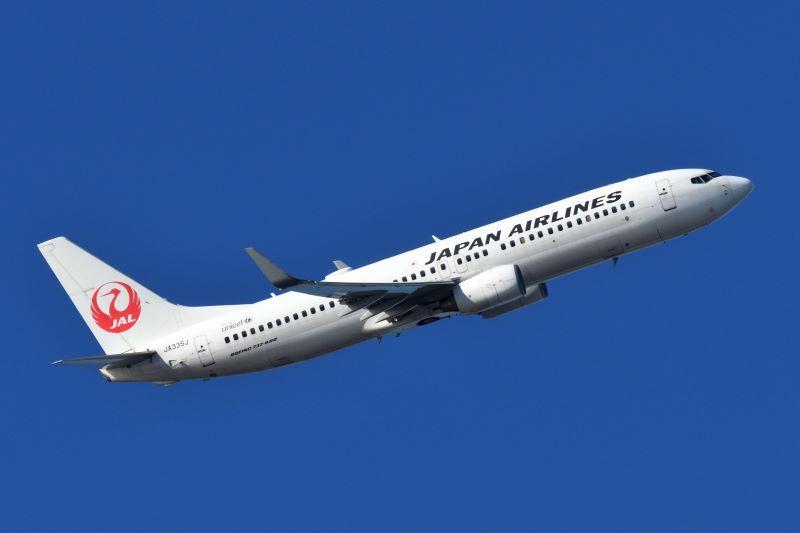
Intelsat to upgrade JAL 737s, 767s with 2Ku connectivity
Intelsat reached an agreement with long-time customer Japan Airlines (JAL) to upgrade about 50 Boeing 737s and 767s to the company’s 2Ku inflight connectivity solution.
In addition to the fleet of Boeing 737s and 767s, JAL’s subsidiary airline, J-AIR Co. Ltd. is currently installing Intelsat’s 2Ku system on the carrier’s fleet of Embraer E190 aircraft. As recently announced, J-AIR will complete installation of the 2Ku system on 14 E190s by the end of 2024. When completed, J-AIR will be the first regional airline in Japan to offer inflight entertainment and connectivity services.
This year’s Aircraft Interiors Expo (AIX) has shown the world that the industry continues to evolve as more collaborations are resulting in bringing aviation forward in a world full of ongoing challenges. From new developments in areas including accessible travel to more sustainable operations in the cabin and beyond, new innovations are being rolled out.
Here are some of the latest products that our editors thought were noteworthy at AIX, which was held in Hamburg, Germany, from June 6-8, 2023.
